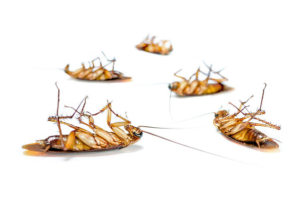Why Do Cockroaches Die On Their Backs? – Interesting Facts
If you have ever encountered a dead cockroach, you probably have found that most of them are lying on their backs. This position seems unnatural as it is commonly seen in homes, and people get puzzled over why these insects end up in such a position. The reasons are interestingly rooted in biology.
In this blog, we will be talking about why cockroaches die in this particular position and some related questions that will help you learn more about these hardy insects.

Why Do Cockroaches Die On Their Backs?
When a cockroach gets killed on its back, it is usually due to the structure of its body. The insect has its hard exoskeleton as a protective layer over internal organs and a very different system of nerves that control their muscles.
However, due to the heaviness and low center of gravity within the cockroach’s body, it is relatively difficult for the roach to move over once it has got flipped over.
Another reason is that when old or sick cockroaches start to weaken in muscle power, they do not have enough to flip themselves back over onto their feet. Loss of coordination will often result in muscle spasms and thus leave them upside down.
Generally, lacking natural predators that would intervene and, like in the wild, save them from death, they often remain in this unnatural position until death ensues.
Also, when the cockroach is exposed to some types of insecticides or poison, the nervous system starts getting affected and it will start jerking in a muscle spasm and, finally, flip into a back position.
That is the reason you always find dead roaches in your house lying on their backs after some chemical treatment.
Why Don’t Cockroaches Die on Their Stomach?
The most fundamental reason cockroaches rarely die on their stomach is the interaction of the muscles with the exoskeleton. Their legs become non-functional when their nervous systems begin to fail because of age, illness, or exposure to insecticides.
The exoskeleton of a cockroach is tough and rigid, and when the muscles controlling their legs stop contracting properly, they lose their balance. Most of the time, they roll over onto their backs in a last-ditch effort because of a lack of muscle coordination.
Yet, another reason why you can’t really see cockroaches die on their stomach is because once they fall, their flat back sides have them glued to the bottom. Since cockroaches don’t have any grasp or the capacity to latch to something as an outdoor floor would present uneven ground surfaces, there’s no leverage to return them to an upright posture and thus get stuck to die in a flipped-over position.
Do Cockroaches Always Die On Their Backs?
Most of the time, dead cockroaches lie on their backs; however, not all are like this. It greatly depends on the situation. If a cockroach was caught by another insect or by a predator, for instance, then it could end up on its back or somewhere else.
The outdoor conditions have a better chance of allowing cockroaches to lie on their sides instead because of the grass and soil, among other rough surfaces to which they can hang.
Inside, the elderly or poisoned roach, due to pesticide or poison contact, will more than likely end up on their back because the surface is generally slick. The healthy cockroaches can also fail to orient themselves upside down inside due to a lack of external support and friction from the surfaces.
However, at times, such cases do not always result in killing the roach on its back, especially if the insect is severely mangled or squeezed in a tight spot.
Do Cockroaches Die on Their Back Because of Insecticides?
Yes, often, insecticides are a primary cause of cockroaches dying on their backs. Most household pest control chemicals attack the nervous system of the insect, causing spasms in the muscles of the insect. Consequently, cockroaches lose coordination and roll over onto their backs and die.
Some chemicals dehydrate the cockroaches, and abrasive granules may be damaging to their exoskeleton or gut lining, thereby causing inner problems that cause death. Products containing sodium borate and borax work best as they disrupt the nervous systems of roaches and cause death in an unnatural position.
Another reason for this is that some insecticides are neurotoxins. These chemicals affect the neurons and muscle cells of the roach, causing it to have severe spasms in its muscles and eventually paralysis. This is why cockroaches often end up on their backs after encountering chemical treatments.
What Can I Do If I See a Dead Cockroach?
Having seen one dead cockroach in the house can be an undetected infestation problem. Here is how to act if you encounter one roach:
- Clean the place using one of the most commonly available home cleaning agents, as cockroaches carry bacteria.
- If you find one dead roach, then you realize that there must be dozens of them around.
- All you need to do is check dark corners, places under appliances, and similar other hiding places.
- It might be advisable to use food lures or chemical granules to prevent further infestation. These usually contain a small amount of borax or other effective pest control chemicals.
- If the infestation persists, it’s time to call in the professionals for proper cockroach control.
A huge dead cockroach population in the house serves as a warning sign that should be taken care of proactively. Cleanliness, sealing of gaps, and use of a reliable solution for pest control will eliminate any cockroaches from entering or staying in your house.
Conclusion
Cockroaches mainly die lying on their backs. This is due to their body structure, weakened muscles, and damage to their nervous system. All these factors combined with smooth surfaces, the application of insecticides, and old age contribute to dying in an unnatural position. All this helps you identify whether there is an infestation and what you can do to prevent it.
FAQs
Q1: Can cockroaches survive on their backs?
A1: No, once cockroaches are on their backs, it’s difficult for them to flip over without help due to their heavy exoskeleton and weakened muscles.
Q2: Do all types of cockroaches die on their backs?
A2: Not necessarily. While it’s common, it’s not guaranteed. Cockroach species that live in the wild often have more chances to grab onto uneven surfaces and avoid flipping.
Dealing with Roach Infestation?
Can’t find any way to fight and win with roach infestation? Let our experts help you with this. Call us today and get a free quote now!

